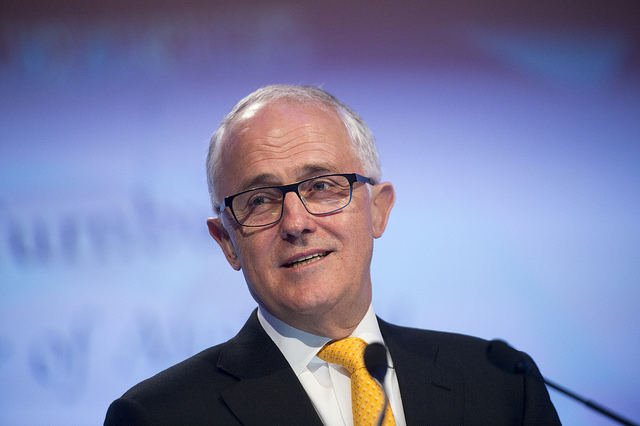“The Chinese use two brush strokes to write the word ‘crisis’. One brush stroke stands for danger; the other for opportunity. In a crisis, be aware of the danger – but recognise the opportunity.”
― John F. Kennedy
We are close to a crisis today in Australian politics. In recent days the lingering distractions of the same-sex marriage marathon and the dual citizenship debacle have been compounded by various threats within the Turnbull government by some wanting to cross the floor on a banking commission, one who wants to leave the party, and from the fallout from the decision to delay the return of Parliament. It all leads to intensifying rumours of a challenge to Turnbull’s leadership.
The actual threat to Turnbull is exaggerated – both for the lack of a viable alternative and because another leadership change would seriously offend the electorate, effectively guaranteeing defeat at the next election. But Turnbull will need to do much more than just promise an undefined tax cut to the low- to middle-income earner if he is to seize the opportunity to reposition himself and his government against this crisis.
The opportunity, and the challenge, is to now lead the debate and the policy process to deliver genuine, broad-based reform of the entire tax system.
While there are obvious political risks in him doing this, having to initially build the electoral and political support for such reform, and then having to design and explain a package of initiatives that would deliver, and finally to manage the package through the Parliament, clearly admitting and dealing with both the inevitable winners and losers, I believe the electorate would soon applaud such leadership, and cut him considerable electoral slack to proceed.
He would be seen, at last, to be living up to some of the expectations about “good government” that he created on seizing the leadership from Abbott.
However, tax reform is now a significant challenge given that the issue has been left to drift for so long, and the task has been compounded by various ad-hoc initiatives in recent years, at both state and federal level, most notably the foreign workers and bank taxes, some attempts at stamp duty/land tax swaps, and the imploding GST distribution issue.
Nevertheless, government policy-makers do know what is required for genuine reform, being able to draw on several major reviews of the tax system, stretching from Asprey in the mid 1970s to Henry, most recently. They could also draw on the considerable expertise and preparedness of the tax industry. It has only ever been a question of political will.
There are several clear imperatives for tax reform, including the unsustainability of bracket creep and the corporate tax base; the need for global competitiveness of effective tax rates; the need to limit the capacity of multinationals to shift profits and minimise their tax; the need to broaden the tax base, including the coverage of the GST; the need to reduce excessive and unfair “concessions”; the need to rationalise state and federal taxes and deal with GST distribution; the need to improve links with the transfer system; and so on.
And all this against the imperative to ensure budget repair, especially given the considerable, unfunded, spending commitments through the 2020s in education, health, the National Disability Insurance Scheme, defence, and infrastructure.
Turnbull’s recent commitment to personal tax cuts, being interpreted as merely adjustments to a couple of tax scales, would represent just another piece of ad hockery that, in isolation, would probably be unaffordable, even with improved revenue growth, at a cost of some $4 billion to $5 billion.
Moreover, this would be seen as little better than a “hamburger and milkshake” benefit to the average household, no match for the recent, serious blowout in their costs of living – housing, power, childcare, health and education, and so on. At best, it would give back just some of what has been taken by way of the bracket creep that worked to improve recent budgets, and is the essence of the so-called return to surplus in 2020/21.
It is also important to recognise that the promised “surplus” in 20/21 has been “assumed”, driven by the assumed near doubling of wages growth in the next few years – a heroic assumption indeed!
Genuine, broad-based, tax reform should be Turnbull’s exit from the current political crisis. It would also enable him to include full corporate tax reform as part of that package, having failed to win the argument to date.
The electorate is offended by his tendency to wallow in the job of Prime Minister, rather than doing it: that is leading, solving problems, and delivering meaningful policy outcomes. He is obviously having a “Great and Exciting Time”. But, speak with those in his team sitting on shrinking primary votes in marginal seats. Are they smiling?
Protest votes are an ever-increasing feature of our democracy. The electorate has lost respect for, and confidence in, the major parties that have become excessively self-absorbed, short-term in their focus, populous, opportunistic, and mostly negative – concentrating on point scoring and blame shifting.
Turnbull desperately needs to rise above this political mire. It will be his only salvation.
First published at the Sydney Morning Herald on Thursday 23 November 2017.





Recent Comments